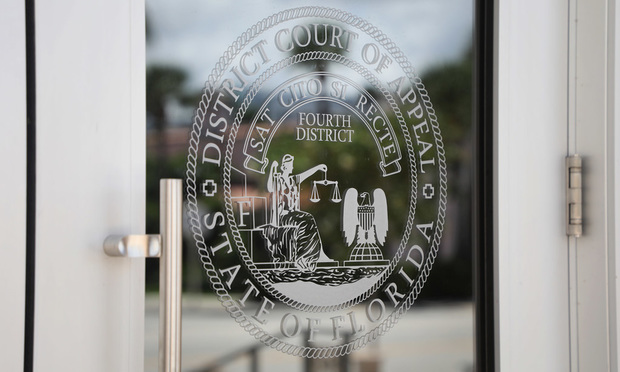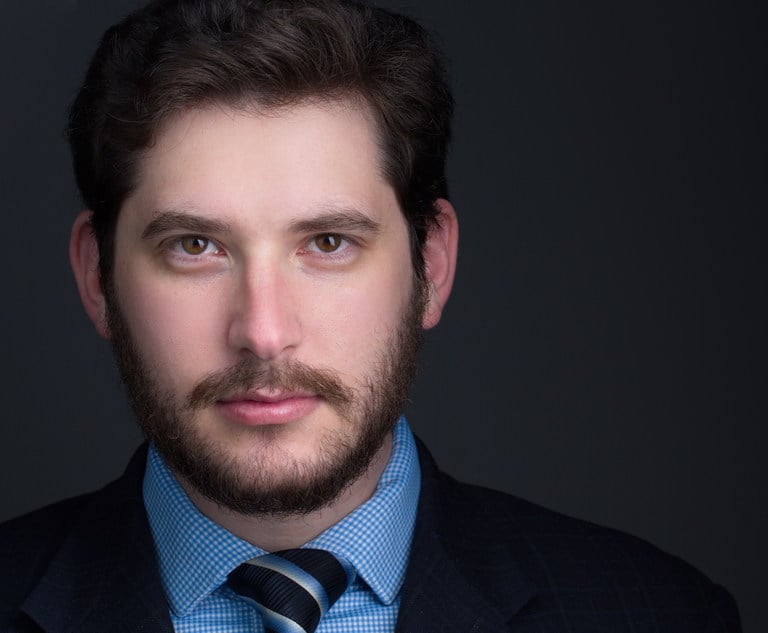Court Sides With Broward Lawyer in Lengthy Fee Dispute With Friend Turned Client
Fort Lauderdale lawyer Ira Marcus won an appeal against a close friend who became a client — but not before the legal battle ruined their 30-year friendship.
May 09, 2019 at 02:45 PM
5 minute read
 The Florida Fourth District Court of Appeal sided with Broward lawyer Ira Marcus, locked in a lengthy fee dispute with a friend turned client. Photo: J. Albert Diaz/ALM.
The Florida Fourth District Court of Appeal sided with Broward lawyer Ira Marcus, locked in a lengthy fee dispute with a friend turned client. Photo: J. Albert Diaz/ALM.
The Fourth District Court of Appeal agreed with Fort Lauderdale lawyer Ira Marcus and his firm Ira Marcus P.A. on Wednesday, finding no foul play in a contingency fee agreement with his close friend turned client — but not before the protracted fight ruined the relationship.
When business owner Stuart Bornstein asked his friend of 30 years to take on a case against the City of Coral Gables, Marcus was reluctant.
“I said, 'I don't want to take it. I don't want to ruin a friendship,' ” Marcus said.
But Marcus eventually agreed. The case had been filed by another lawyer and wasn't going well, according to Marcus. Bornstein and his business partner had taken a $4 million loan from the city for their company Granada LLC to oversee renovations and manage its country club. Renovations cost $2.6 million more than anticipated — money Bornstein and his partner fronted — so they sued to get it back.
Bornstein hired Marcus with a $50,000 retainer, under a 40% contingency fee agreement, promising to refund the retainer if the case succeeded. The city had offered nothing, but after Marcus took over it eventually agreed to a $1.45 million settlement.
That wasn't easy, according to Marcus' attorney, Robert M. Klein of Klein Glasser Park & Lowe in Miami.
“ This case reminds me of the phrase, 'No good deed goes unpunished,' ” Klein said. ”[Marcus] completely turned this case around.”
Under the fee agreement, Marcus' 40%, minus the retainer fee, was $530,000. Bornstein disputed that amount, according to Marcus, claiming it was too much. Marcus agreed to reduce his rate to a flat fee of $450,000 and drew up a new distribution agreement, which said Bornstein's company would net $880,816.
According to Wednesday's court opinion, Bornstein signed that agreement but later complained that his amount was incorrect because it was missing the $50,000 retainer refund promised in the first agreement. The second agreement bore no mention of it
Borstein sued Marcus for civil theft, conversion and breach of contract in 2010. He also filed a complaint against Marcus with the Florida Bar, which ultimately dropped the case. The trial court ruled in Marcus' favor, finding his agreement was clear and acted as a novation — meaning it canceled out the original plan.
Bornstein's lawyers — Xavier A. Franco, George E. McArdle and Michael A. Mullavey of McArdle, Perez & Franco in Coral Gables, and John P. Seiler of Seiler Sautter Zaden Rimes & Wahlbrink in Fort Lauderdale — did not respond to requests for comment.
But Bornstein argued neither party agreed to discard the original retainer refund.
The Fourth DCA gave credence to that, as testimony from both sides suggested they didn't mean to replace the entire agreement, but rather meant to modify it.
“The question then becomes whether the trial court reached the right result on appellants' breach of contract claims, but for the wrong reasons,” the opinion said.
The answer was yes, as the Fourth DCA ruled the parties had modified the agreement but changed both the contingency fee and retainer provision.
'Be careful'
Marcus' lawyer said he's delighted.
“We felt from day one that the case was crystal clear,” Klein said.
In Klein's view, the case offers an important lesson about representing friends and family: Don't do it.
“Be very careful when you take on cases for friends and family, because often their expectations are incredibly high,” Klein said. “And at the same time, because of their relationships, they often feel that they can really negotiate or reconsider fee agreements that you've reached. … It's probably not worth straining relationships.”
For Marcus, it's been a long nine years.
“I was depressed and I grieved at the loss of the relationship because it was a very important, valuable relationship to me,” Marcus said. “It was horrible that $50,000 would ruin it.”
Marcus said he feels vindicated and could seek more than $1.1 million in attorney fees.
Chief Judge Elizabeth Metzger of the Nineteenth Circuit wrote the opinion sitting by designation, with Fourth DCA Chief Judge Jonathan Gerber and Judge Burton Conner concurring.
Read the full court opinion:
Read more:
Livestock Owner Not to Blame for Crash Caused by Runaway Cows, Court Rules
$1.2 Million Attorney Fee Award Upheld in 24th Year of South Florida Contract Dispute
This content has been archived. It is available through our partners, LexisNexis® and Bloomberg Law.
To view this content, please continue to their sites.
Not a Lexis Subscriber?
Subscribe Now
Not a Bloomberg Law Subscriber?
Subscribe Now
NOT FOR REPRINT
© 2025 ALM Global, LLC, All Rights Reserved. Request academic re-use from www.copyright.com. All other uses, submit a request to [email protected]. For more information visit Asset & Logo Licensing.
You Might Like
View All
Tragedy on I-95: Florida Lawsuit Against Horizon Freight System Could Set New Precedent in Crash Cases
2 minute read
'You Lied to the Jury': Veteran Awarded $5 Million in Defamation Case Against CNN
4 minute read
Vedder Price Shareholder Javier Lopez Appointed to Miami Planning, Zoning & Appeals Board
2 minute readTrending Stories
- 1How ‘Bilateral Tapping’ Can Help with Stress and Anxiety
- 2How Law Firms Can Make Business Services a Performance Champion
- 3'Digital Mindset': Hogan Lovells' New Global Managing Partner for Digitalization
- 4Silk Road Founder Ross Ulbricht Has New York Sentence Pardoned by Trump
- 5Settlement Allows Spouses of U.S. Citizens to Reopen Removal Proceedings
Who Got The Work
J. Brugh Lower of Gibbons has entered an appearance for industrial equipment supplier Devco Corporation in a pending trademark infringement lawsuit. The suit, accusing the defendant of selling knock-off Graco products, was filed Dec. 18 in New Jersey District Court by Rivkin Radler on behalf of Graco Inc. and Graco Minnesota. The case, assigned to U.S. District Judge Zahid N. Quraishi, is 3:24-cv-11294, Graco Inc. et al v. Devco Corporation.
Who Got The Work
Rebecca Maller-Stein and Kent A. Yalowitz of Arnold & Porter Kaye Scholer have entered their appearances for Hanaco Venture Capital and its executives, Lior Prosor and David Frankel, in a pending securities lawsuit. The action, filed on Dec. 24 in New York Southern District Court by Zell, Aron & Co. on behalf of Goldeneye Advisors, accuses the defendants of negligently and fraudulently managing the plaintiff's $1 million investment. The case, assigned to U.S. District Judge Vernon S. Broderick, is 1:24-cv-09918, Goldeneye Advisors, LLC v. Hanaco Venture Capital, Ltd. et al.
Who Got The Work
Attorneys from A&O Shearman has stepped in as defense counsel for Toronto-Dominion Bank and other defendants in a pending securities class action. The suit, filed Dec. 11 in New York Southern District Court by Bleichmar Fonti & Auld, accuses the defendants of concealing the bank's 'pervasive' deficiencies in regards to its compliance with the Bank Secrecy Act and the quality of its anti-money laundering controls. The case, assigned to U.S. District Judge Arun Subramanian, is 1:24-cv-09445, Gonzalez v. The Toronto-Dominion Bank et al.
Who Got The Work
Crown Castle International, a Pennsylvania company providing shared communications infrastructure, has turned to Luke D. Wolf of Gordon Rees Scully Mansukhani to fend off a pending breach-of-contract lawsuit. The court action, filed Nov. 25 in Michigan Eastern District Court by Hooper Hathaway PC on behalf of The Town Residences LLC, accuses Crown Castle of failing to transfer approximately $30,000 in utility payments from T-Mobile in breach of a roof-top lease and assignment agreement. The case, assigned to U.S. District Judge Susan K. Declercq, is 2:24-cv-13131, The Town Residences LLC v. T-Mobile US, Inc. et al.
Who Got The Work
Wilfred P. Coronato and Daniel M. Schwartz of McCarter & English have stepped in as defense counsel to Electrolux Home Products Inc. in a pending product liability lawsuit. The court action, filed Nov. 26 in New York Eastern District Court by Poulos Lopiccolo PC and Nagel Rice LLP on behalf of David Stern, alleges that the defendant's refrigerators’ drawers and shelving repeatedly break and fall apart within months after purchase. The case, assigned to U.S. District Judge Joan M. Azrack, is 2:24-cv-08204, Stern v. Electrolux Home Products, Inc.
Featured Firms
Law Offices of Gary Martin Hays & Associates, P.C.
(470) 294-1674
Law Offices of Mark E. Salomone
(857) 444-6468
Smith & Hassler
(713) 739-1250







